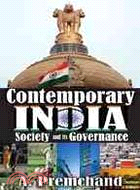Contemporary India: Society and Its Governance
商品資訊
ISBN13:9781412813181
出版社:Transaction Pub
作者:A. Premchand
出版日:2010/04/01
裝訂/頁數:精裝/545頁
定價
:NT$ 9860 元若需訂購本書,請電洽客服 02-25006600[分機130、131]。
商品簡介
作者簡介
相關商品
商品簡介
This book offers a semiotically informed ethnographic study of contemporary culture in Rajasthan and in India generally. It adapts the methodology of analyzing cultures found in Roland Barthes' semiotic portrait of Japanese culture, Empire of Signs, but adds an analysis of lifestyles as explicated in the work of social anthropologist Mary Douglas, political scientist Aaron Wildavsky, and a number of other social scientists. This manuscript is, at first, a guide to Rajasthan and India, and it is that but it is also more in that it considers tourism from both an anthropological and sociological level.
As a nation India is very old. It had deep roots in its pre-colonial history, but it is also a product of Western-style democracy, which has shaped and even created the nation. Democracy Indian Style focuses on the Indian factors underlying its successful democracy by describing and analyzing the life of Subhas Chandra Bose, who competed with Nehru for the role of Gandhi's heir, and his impact on India before and after independence.
Recent theoretical and methodological innovations in the anthropological analysis of South Asian societies have introduced distinctive modifications in the study of Indian social structure and social change. This book, reporting on twenty empirical studies of Indian society conducted by outstanding scholars, reflects these trends not only with reference to Indian society itself, but also in terms of the relevance of such trends to an understanding of social change more generally.
Soon after independence, Indian political leadership decided to pursue the attainment of four self-stipulated goals: to attain an improved standard of living through higher rates of growth, to establish a functioning political democracy, to achieve social equality through social re-engineering, and to make a quick transition in making government a servant of the public rather than being its master as was the case during the previous colonial regime. This book describes the journey from the past to the present in the articulation of these goals and evaluates the extent to which they have been achieved.
This book is based on the belief that there is at work a principle of reciprocal causation between society and government. What society wants becomes a mandate for the government. That government is not a disinterested party and its actions, and failures to act, have an immense impact on the working of society. Premchand asserts that there is no aspect of civic life in India that is immune from governmental action. This relationship between government and society during the last six decades since independence is intensively examined.
India is a land of paradoxes and surprises. The book covers political, social, and administrative developments during the last decades to provide perspective on the changing relationship between society and governments at various levels. This is followed by studies of the various ways in which classification systems are used in India today, the urban-rural divide, non-resident Indians as neo-change agents, emerging pattern of classes, and the resurgence of religion in everyday life. The final chapters deal with the vast range of discontents in governance, corruption and its impact on civic life, the myth of law and order, and the emergence of a public voice in policymaking. The work is fair, balanced, tough minded, and revealing. It is a must read for specialists, policymakers, and people worldwide for whom India is a civilization of inexhaustible interest.
As a nation India is very old. It had deep roots in its pre-colonial history, but it is also a product of Western-style democracy, which has shaped and even created the nation. Democracy Indian Style focuses on the Indian factors underlying its successful democracy by describing and analyzing the life of Subhas Chandra Bose, who competed with Nehru for the role of Gandhi's heir, and his impact on India before and after independence.
Recent theoretical and methodological innovations in the anthropological analysis of South Asian societies have introduced distinctive modifications in the study of Indian social structure and social change. This book, reporting on twenty empirical studies of Indian society conducted by outstanding scholars, reflects these trends not only with reference to Indian society itself, but also in terms of the relevance of such trends to an understanding of social change more generally.
Soon after independence, Indian political leadership decided to pursue the attainment of four self-stipulated goals: to attain an improved standard of living through higher rates of growth, to establish a functioning political democracy, to achieve social equality through social re-engineering, and to make a quick transition in making government a servant of the public rather than being its master as was the case during the previous colonial regime. This book describes the journey from the past to the present in the articulation of these goals and evaluates the extent to which they have been achieved.
This book is based on the belief that there is at work a principle of reciprocal causation between society and government. What society wants becomes a mandate for the government. That government is not a disinterested party and its actions, and failures to act, have an immense impact on the working of society. Premchand asserts that there is no aspect of civic life in India that is immune from governmental action. This relationship between government and society during the last six decades since independence is intensively examined.
India is a land of paradoxes and surprises. The book covers political, social, and administrative developments during the last decades to provide perspective on the changing relationship between society and governments at various levels. This is followed by studies of the various ways in which classification systems are used in India today, the urban-rural divide, non-resident Indians as neo-change agents, emerging pattern of classes, and the resurgence of religion in everyday life. The final chapters deal with the vast range of discontents in governance, corruption and its impact on civic life, the myth of law and order, and the emergence of a public voice in policymaking. The work is fair, balanced, tough minded, and revealing. It is a must read for specialists, policymakers, and people worldwide for whom India is a civilization of inexhaustible interest.
作者簡介
A. Premchand was formerly assistant director for the International Monetary Fund---Fiscal Affairs Department (now retired) in Washington, DC. Some of his works include Government Financial Management: Issues and Country Studies, Effective Government Accounting and Control of Public Money: The Fiscal Machinery in Developing Countries.
主題書展
更多
主題書展
更多書展今日66折
您曾經瀏覽過的商品
購物須知
外文書商品之書封,為出版社提供之樣本。實際出貨商品,以出版社所提供之現有版本為主。部份書籍,因出版社供應狀況特殊,匯率將依實際狀況做調整。
無庫存之商品,在您完成訂單程序之後,將以空運的方式為你下單調貨。為了縮短等待的時間,建議您將外文書與其他商品分開下單,以獲得最快的取貨速度,平均調貨時間為1~2個月。
為了保護您的權益,「三民網路書店」提供會員七日商品鑑賞期(收到商品為起始日)。
若要辦理退貨,請在商品鑑賞期內寄回,且商品必須是全新狀態與完整包裝(商品、附件、發票、隨貨贈品等)否則恕不接受退貨。
























